Exchange Rates Impact Global Trade
国际贸易用英语怎么说

国际贸易用英语怎么说International Trade Terms in EnglishInternational trade plays a vital role in the global economy. It involves the exchange of goods, services, and capital among different countries. To engage in international trade, it is crucial to understand the various terms and phrases used in the English language. In this article, we will explore some of the commonly used terms in international trade.1. Import/export: These terms refer to the buying and selling of goods and services between countries. Import refers to bringing goods or services into a country, whereas export refers to sending goods or services to another country.2. Tariffs: Tariffs are taxes imposed on imported goods or services. They are used to protect domestic industries, regulate trade, and generate revenue for the government. Tariffs can be specific (based on the quantity or weight of the goods) or ad valorem (based on the value of the goods).3. Quotas: Quotas are a type of trade restriction that limits the quantity or value of goods that can be imported or exported. They are often used to protect domestic industries and maintain a balance of trade.4. Free trade: Free trade refers to the unrestricted exchange of goods and services between countries, without any barriers such as tariffs or quotas. It promotes economic growth, efficiency, and specialization.5. Trade deficit/surplus: A trade deficit occurs when a country imports more goods and services than it exports. This leads to a negative balance oftrade. On the other hand, a trade surplus occurs when a country exports more goods and services than it imports, resulting in a positive balance of trade.6. Trade agreement: A trade agreement is a pact between two or more countries that outlines the terms and conditions of trade. It typically reduces trade barriers and facilitates economic cooperation. Examples include the North American Free Trade Agreement (NAFTA) and the European Union (EU).7. Incoterms: Incoterms, short for International Commercial Terms, are internationally recognized terms that define the responsibilities and liabilities of buyers and sellers in international trade transactions. They specify who is responsible for transportation, insurance, customs, and other costs.8. Letter of credit: A letter of credit is a financial document issued by a bank on behalf of a buyer, guaranteeing payment to the seller upon the completion of certain conditions. It provides security and assurance in international trade transactions.9. Foreign exchange: Foreign exchange involves the conversion of one currency into another for the purpose of international trade. Exchange rates fluctuate based on market conditions and can directly impact the cost and profitability of trade.10. Trade barriers: Trade barriers are restrictions or obstacles that limit or prevent the free flow of goods and services between countries. They can be in the form of tariffs, quotas, embargoes, regulations, or customs duties.11. Dumping: Dumping refers to the practice of selling goods in a foreign market at a lower price than in the domestic market. It is seen as unfair competition and can harm domestic industries.12. Intellectual property rights: Intellectual property rights protect creations of the mind, such as patents, trademarks, and copyrights. They ensure that individuals or companies have exclusive rights and control over their inventions, designs, or artistic works.13. WTO (World Trade Organization): The WTO is an international organization that deals with the global rules of trade between nations. It promotes free trade, settles trade disputes, and provides a platform for negotiations.14. Trade surplus/deficit: A trade surplus occurs when a country exports more goods and services than it imports, resulting in a positive balance of trade. Conversely, a trade deficit occurs when a country imports more goods and services than it exports, leading to a negative balance of trade.15. Bilateral/multilateral trade: Bilateral trade refers to trade between two countries, whereas multilateral trade involves multiple countries. Bilateral trade agreements focus on the specific needs and interests of the two countries, while multilateral trade agreements involve more complex negotiations among several nations.In conclusion, international trade terminology is essential for various stakeholders involved in global commerce. Understanding these terms enables effective communication and negotiation in international trade transactions. By familiarizing ourselves with these terms, we can navigatethe complexities of international trade and engage in successful business relationships across borders.。
外贸合同汇率波动英文版

外贸合同汇率波动英文版【原创实用版】目录1.外贸合同的概念与重要性2.汇率波动对外贸合同的影响3.如何应对汇率波动带来的风险4.英文版外贸合同的汇率条款正文一、外贸合同的概念与重要性外贸合同,即国际贸易合同,是指我国与其他国家或地区之间进行的商品买卖、劳务输出等经济贸易活动的法律文件。
在国际贸易中,外贸合同是保障双方权益、明确交易条款和规定交货条件的重要依据。
因此,一份完整且严谨的外贸合同对于确保交易顺利进行具有举足轻重的地位。
二、汇率波动对外贸合同的影响汇率波动是指货币之间的兑换比率发生波动。
由于外贸合同涉及跨国货币交易,汇率波动可能给合同双方带来巨大的经济损失。
具体表现在以下几个方面:1.合同价格波动:汇率波动可能导致进口商品成本或出口商品收入发生变动,进而影响到合同双方的利益。
2.交易风险增加:汇率波动可能导致交易不确定性增加,影响双方的信任和合作关系。
3.财务风险:汇率波动可能导致企业外汇兑换损失或收入减少,影响企业的财务状况和经营成果。
三、如何应对汇率波动带来的风险为降低汇率波动对外贸合同的影响,企业可以采取以下措施:1.签订汇率条款:在合同中明确汇率变动范围或采用固定汇率等措施,以降低汇率波动带来的风险。
2.采用风险管理工具:如远期汇率协议、期权等金融衍生品,以对冲汇率波动风险。
3.多元化业务:开展多元化业务和市场,以分散汇率波动风险。
4.提高对外汇市场的预测能力:加强对国际经济形势和外汇市场的研究,提高预测汇率波动的能力。
四、英文版外贸合同的汇率条款在国际贸易中,为应对汇率波动带来的风险,外贸合同中的汇率条款至关重要。
以下是一个英文版外贸合同的汇率条款示例:"The parties agree that the exchange rate for the payment of the goods shall be based on the spot rate on the date of payment, plus or minus 3% to account for any fluctuations in the exchange rate.In the event that the exchange rate fluctuates beyond this range, the parties shall negotiate in good faith to determine a revised exchange rate."综上所述,外贸合同是国际贸易中不可或缺的一部分,而汇率波动则是外贸合同中的一个重要风险因素。
国际金融名词解释

国际金融名词解释国际金融是指涉及多个国家经济体系和货币体系之间的财务和投资活动。
在这个全球化的时代,国际金融变得越来越重要,各国间的经济联系和金融交流不断增加。
在进行国际金融交易和合作时,我们常会面对一些专业术语和名词,下面是一些常见的国际金融名词解释。
1. 外汇市场 (Foreign Exchange Market)外汇市场是进行货币买卖的金融市场,它主要涉及不同国家的货币兑换。
外汇市场的参与者包括商业银行、投资公司、中央银行和个人投资者。
外汇市场的波动受到众多因素的影响,包括宏观经济指标、政治事件、国际贸易等。
2. 外汇汇率 (Foreign Exchange Rate)外汇汇率是指一种货币与另一种货币之间的兑换比例。
汇率的波动对于国际贸易和投资非常重要,它直接影响着不同国家之间的货币转换和国际资本流动。
外汇汇率可以是固定汇率,也可以是浮动汇率,具体取决于国家的货币政策。
3. 国际收支 (Balance of Payments)国际收支是一个国家与其他国家之间经济交易和金融流动的统计记录。
它包括贸易收支、资本流动、国际投资收益等各方面的数据。
国际收支的平衡与否对一个国家的宏观经济稳定和国际信誉有着重要影响。
4. 国际贸易 (International Trade)国际贸易是指不同国家之间的商品和服务的交换。
国际贸易的发展对于全球经济增长和国家繁荣至关重要。
国际贸易可以通过进口和出口来实现,各国之间进行贸易往往依赖于比较优势和竞争力。
5. 跨国公司 (Multinational Corporation)跨国公司是指在多个国家开展业务和经营活动的公司。
跨国公司通常在各个国家设立子公司或分支机构,以便更好地适应不同国家的市场和法律环境。
跨国公司的出现推动了国际经济一体化和全球化进程。
6. 国际金融机构 (International Financial Institutions)国际金融机构是为促进国际金融合作和稳定而设立的国际组织。
宏观经济学英文名词

宏观经济学英文名词宏观经济学(Macroeconomics)是经济学的一个分支,研究整个经济系统的总体行为和发展趋势。
它关注的是国家和地区整体经济,而不是个体经济主体的行为。
下面是一些与宏观经济学相关的英文名词和参考内容:1. GDP (Gross Domestic Product): GDP is the total value of all goods and services produced within a country's borders in a specific period of time. It is widely used as a measure of economic growth and is a key indicator of a country's overall economic performance.2. Inflation: Inflation refers to the increase in the general price level of goods and services over a period of time. It is usually measured by the Consumer Price Index (CPI) or the Producer Price Index (PPI). High inflation can erode purchasing power and lead to economic instability.3. Unemployment rate: The unemployment rate is the percentage of the labor force that is unemployed and actively seeking employment. It is an important indicator of the health of an economy and can have significant social and political implications.4. Fiscal policy: Fiscal policy refers to the use of government spending and taxation to influence the overall economy. It can be expansionary (increasing government spending or reducing taxes) or contractionary (reducing government spending or increasing taxes) depending on the state of the economy.5. Monetary policy: Monetary policy involves the control and regulation of the money supply and interest rates by a central bank, such as the Federal Reserve in the United States. It is used to stabilize the economy, control inflation, and promote economic growth.6. Exchange rate: The exchange rate is the value of one currency in terms of another currency. Changes in exchange rates can have a significant impact on international trade, investment, and economic competitiveness.7. Balance of trade: The balance of trade is the difference betweena country's exports and imports of goods and services. A positive balance of trade (exporting more than importing) is known as a trade surplus, while a negative balance of trade is known as a trade deficit. This indicator is important for measuring a country's international trade competitiveness.8. Economic growth: Economic growth refers to an increase in the production and consumption of goods and services in an economy over time. It is usually measured by the annual percentage change in real GDP. Sustainable economic growth is a key goal for most countries.9. Aggregate demand: Aggregate demand is the total demand for goods and services in an economy at a given price level and period of time. It is affected by factors such as consumer spending, investment, government spending, and net exports.10. Business cycle: The business cycle refers to the fluctuations ineconomic activity over time. It consists of four phases: expansion (growth), peak (highest point), contraction (slowdown), and trough (lowest point). Understanding the business cycle is important for predicting and managing economic fluctuations.These are just a few examples of the many concepts and terms used in the field of macroeconomics. They provide insights into the overall performance, trends, and policies that shape an economy.。
国际结算,国际金融和国际贸易实务 英文

国际结算,国际金融和国际贸易实务英文International Settlement, International Finance, and International Trade PracticesThe global economy has become increasingly interconnected, with countries and businesses engaging in cross-border transactions on a daily basis. This has led to the emergence of a complex web of international settlement, finance, and trade practices that are essential for the smooth functioning of the global marketplace. In this essay, we will explore the key aspects of international settlement, international finance, and international trade practices, and discuss their importance in the modern world.International SettlementInternational settlement refers to the process of transferring funds between parties in different countries to facilitate international trade and investment. This process involves the exchange of different currencies, the management of foreign exchange risks, and the coordination of payment systems across borders. One of the primary challenges in international settlement is the need to ensure that payments are made efficiently, securely, and in a timely manner.To address these challenges, various payment methods and settlement systems have been developed. These include wire transfers, letters of credit, and electronic fund transfers, among others. Each of these methods has its own advantages and disadvantages, and the choice of payment method often depends on the specific needs of the transaction, the parties involved, and the regulatory environment.In addition to payment methods, international settlement also involves the management of foreign exchange risks. Fluctuations in exchange rates can have a significant impact on the profitability of international transactions, and businesses must be able to effectively manage these risks to remain competitive. This can involve the use of hedging strategies, such as forward contracts and currency swaps, as well as the implementation of risk management policies and procedures.International FinanceInternational finance refers to the study and practice of financial activities that involve the movement of capital across national borders. This includes the management of foreign exchange, the financing of international trade and investment, and the investment of funds in foreign markets.One of the key aspects of international finance is the management of foreign exchange. This involves the buying and selling of different currencies, the hedging of foreign exchange risks, and the management of currency exposures. Effective foreign exchange management is critical for businesses and individuals engaged in international transactions, as it can have a significant impact on the profitability and risk profile of these activities.Another important aspect of international finance is the financing of international trade and investment. This can involve the use of various financial instruments, such as letters of credit, trade finance, and project finance, to facilitate the movement of goods and capital across borders. These financial instruments are often used to mitigate the risks associated with international transactions, such as political and economic instability, and to provide access to capital for businesses engaged in international trade.In addition to trade and investment financing, international finance also involves the investment of funds in foreign markets. This can include the purchase of foreign stocks, bonds, and other financial assets, as well as the management of cross-border investment portfolios. The global nature of financial markets has led to the development of a wide range of investment strategies and tools that can be used to access and manage international investmentopportunities.International Trade PracticesInternational trade refers to the exchange of goods and services between countries. This involves the movement of goods and services across national borders, the negotiation of trade agreements, and the management of trade-related risks and regulations.One of the key aspects of international trade practices is the negotiation of trade agreements. These agreements establish the rules and regulations that govern the exchange of goods and services between countries, and can include provisions related to tariffs, quotas, and other trade barriers. The negotiation of these agreements is often a complex and politically charged process, as countries seek to balance their own economic interests with the broader goals of global trade liberalization.In addition to trade agreements, international trade practices also involve the management of trade-related risks and regulations. This can include the management of customs and border procedures, the compliance with product standards and regulations, and the mitigation of political and economic risks associated with international transactions. Effective management of these risks and regulations is critical for businesses engaged in international trade,as it can have a significant impact on the profitability and success of their operations.Another important aspect of international trade practices is the logistics and supply chain management involved in the movement of goods across borders. This can include the coordination of transportation, warehousing, and distribution activities, as well as the management of inventory and supply chain risks. Effective supply chain management is essential for ensuring the timely and efficient delivery of goods to international markets.ConclusionIn conclusion, international settlement, international finance, and international trade practices are essential components of the global economy. These practices enable the movement of goods, services, and capital across national borders, and play a critical role in the overall functioning of the global marketplace. As the world becomes increasingly interconnected, the importance of these practices will only continue to grow, and businesses and individuals must be able to navigate this complex landscape effectively in order to succeed in the global economy.。
经济金融术语英汉对照
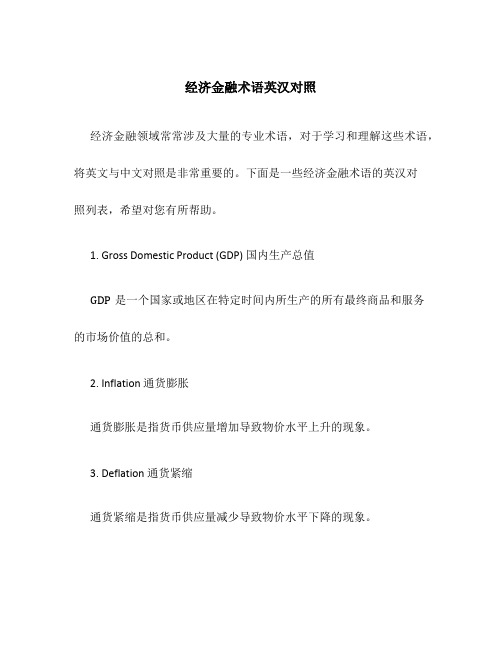
经济金融术语英汉对照经济金融领域常常涉及大量的专业术语,对于学习和理解这些术语,将英文与中文对照是非常重要的。
下面是一些经济金融术语的英汉对照列表,希望对您有所帮助。
1. Gross Domestic Product (GDP) 国内生产总值GDP是一个国家或地区在特定时间内所生产的所有最终商品和服务的市场价值的总和。
2. Inflation 通货膨胀通货膨胀是指货币供应量增加导致物价水平上升的现象。
3. Deflation 通货紧缩通货紧缩是指货币供应量减少导致物价水平下降的现象。
4. Interest Rate 利率利率是指借贷资金所产生的利息与本金之间的比率。
5. Exchange Rate 汇率汇率是指一种货币与另一种货币之间的兑换比率。
6. Stock Market 股票市场股票市场是指买卖股票的场所,也是企业融资的重要途径。
7. Bond 债券债券是一种证券,表示借款人向债权人承诺在一定期限内支付利息和本金。
8. Foreign Direct Investment (FDI) 外商直接投资外商直接投资是指一个国家的企业在另一个国家的企业中进行的长期投资。
9. Taxation 税收税收是政府从个人和企业获得财政收入的一种方式。
10. Budget Deficit 预算赤字预算赤字是指政府支出超过收入的情况,需要通过借贷或印钞等方式来弥补。
11. Trade Surplus/Trade Deficit 贸易顺差/贸易逆差贸易顺差指一个国家的出口额大于进口额,贸易逆差则相反。
12. Monetary Policy 货币政策货币政策是由中央银行制定和执行的调控货币供应量和利率水平的政策。
13. Fiscal Policy 财政政策财政政策是由政府制定和执行的调控财政支出和税收的政策。
14. Central Bank 央行央行是一个国家的货币发行和货币政策的实施机构。
15. Market Economy 市场经济市场经济是一种以市场配置资源和决定价格的经济体制。
外汇的英语名词解释
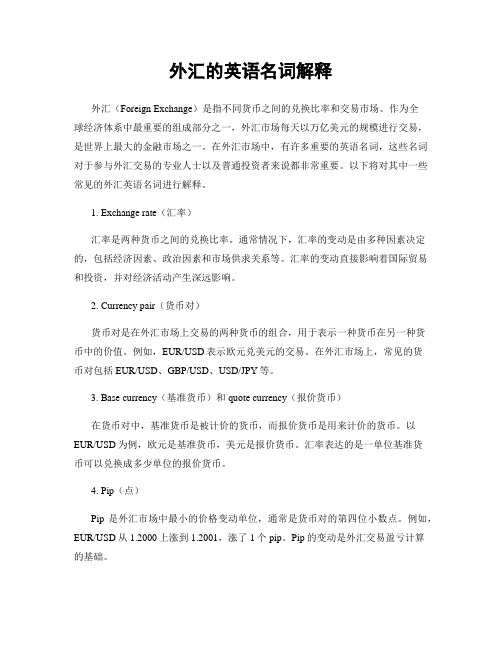
外汇的英语名词解释外汇(Foreign Exchange)是指不同货币之间的兑换比率和交易市场。
作为全球经济体系中最重要的组成部分之一,外汇市场每天以万亿美元的规模进行交易,是世界上最大的金融市场之一。
在外汇市场中,有许多重要的英语名词,这些名词对于参与外汇交易的专业人士以及普通投资者来说都非常重要。
以下将对其中一些常见的外汇英语名词进行解释。
1. Exchange rate(汇率)汇率是两种货币之间的兑换比率。
通常情况下,汇率的变动是由多种因素决定的,包括经济因素、政治因素和市场供求关系等。
汇率的变动直接影响着国际贸易和投资,并对经济活动产生深远影响。
2. Currency pair(货币对)货币对是在外汇市场上交易的两种货币的组合,用于表示一种货币在另一种货币中的价值。
例如,EUR/USD表示欧元兑美元的交易。
在外汇市场上,常见的货币对包括EUR/USD、GBP/USD、USD/JPY等。
3. Base currency(基准货币)和quote currency(报价货币)在货币对中,基准货币是被计价的货币,而报价货币是用来计价的货币。
以EUR/USD为例,欧元是基准货币,美元是报价货币。
汇率表达的是一单位基准货币可以兑换成多少单位的报价货币。
4. Pip(点)Pip是外汇市场中最小的价格变动单位,通常是货币对的第四位小数点。
例如,EUR/USD从1.2000上涨到1.2001,涨了1个pip。
Pip的变动是外汇交易盈亏计算的基础。
5. Bid price(买入价)和ask price(卖出价)买入价和卖出价分别表示在外汇市场上进行买入和卖出交易时的价格。
买入价是交易商愿意支付的价格,而卖出价是交易商愿意出售的价格。
两者之间的差价被称为spread(点差),是交易商的利润来源之一。
6. Margin(保证金)保证金是投资者参与外汇交易时需要提供的一定资金,用于覆盖潜在的亏损。
外汇交易通常采用杠杆,也就是以较小的保证金金额进行较大规模的交易。
国际贸易关键名词英语

国际贸易关键名词英语International Trade Key Terms in EnglishTrade is a fundamental aspect of the global economy, enabling the exchange of goods and services between countries and regions. Understanding the key terms and concepts related to international trade is crucial for businesses, policymakers, and individuals to navigate the complex landscape of global commerce. In this essay, we will explore some of the essential terms and their significance in the context of international trade.One of the most fundamental concepts in international trade is the balance of trade, which refers to the difference between a country's exports and imports. A positive balance of trade, also known as a trade surplus, occurs when a country's exports exceed its imports, while a negative balance of trade, or trade deficit, arises when a country's imports are greater than its exports. The balance of trade is an important indicator of a country's economic performance and can influence its currency exchange rates, foreign investment, and overall economic policies.Another key term in international trade is tariff, which is a tax or dutyimposed on imported goods. Tariffs are often used by governments to protect domestic industries from foreign competition, to generate revenue, or to retaliate against trade practices of other countries. Tariffs can take various forms, such as ad valorem tariffs (based on the value of the imported goods), specific tariffs (based on the quantity or weight of the imported goods), or compound tariffs (a combination of ad valorem and specific tariffs).Closely related to tariffs is the concept of non-tariff barriers (NTBs), which are policy measures other than tariffs that restrict or distort international trade. NTBs can include quotas, licensing requirements, technical standards, sanitary and phytosanitary measures, and other administrative procedures. These barriers can be used to protect domestic industries or to address legitimate concerns, such as consumer safety or environmental protection, but they can also be used as protectionist measures.Another important term in international trade is exchange rate, which is the value of one currency in relation to another. Exchange rates can be fixed (determined by the government) or floating (determined by market forces of supply and demand). Exchange rate fluctuations can have significant impacts on the competitiveness of a country's exports and the cost of its imports, as well as on the investment and financial flows between countries.The concept of comparative advantage is also crucial in international trade. Comparative advantage refers to a country's ability to produce a good or service at a lower opportunity cost than another country. Countries tend to specialize in and export the goods and services in which they have a comparative advantage, while importing the goods and services in which they have a comparative disadvantage. This specialization and trade can lead to greater overall economic efficiency and higher living standards for all participating countries.Another key term in international trade is foreign direct investment (FDI), which refers to the investment made by a company or individual in one country in business interests in another country. FDI can take the form of establishing a new business, acquiring an existing one, or expanding operations in a foreign country. FDI can bring benefits such as technology transfer, job creation, and access to new markets, but it can also raise concerns about the potential for exploitation or loss of domestic control.The World Trade Organization (WTO) is a crucial institution in the global trading system. The WTO is an international organization that sets the rules and regulations for international trade, and it plays a key role in facilitating trade negotiations, resolving trade disputes, and promoting free trade. Membership in the WTO can provide countries with access to larger markets, increased investment, and the opportunity to participate in the global trading system.Another important term in international trade is supply chain, which refers to the network of organizations, resources, and activities involved in the production, distribution, and delivery of a product or service. In the context of global trade, supply chains can span multiple countries and involve complex logistics, transportation, and communication systems. Efficient and resilient supply chains are essential for businesses to remain competitive in the global marketplace.Finally, the concept of globalization is closely tied to international trade. Globalization refers to the increasing interconnectedness and interdependence of economies, societies, and cultures around the world, driven by factors such as technological advancements, reduced trade barriers, and the growth of multinational corporations. Globalization has had a significant impact on international trade, enabling the flow of goods, services, capital, and labor across borders, and creating new opportunities and challenges for businesses and policymakers.In conclusion, understanding the key terms and concepts related to international trade is crucial for navigating the complex and ever-evolving global economy. From the balance of trade and tariffs to exchange rates and comparative advantage, these terms and their underlying principles shape the way countries and businessesengage in international trade. By familiarizing ourselves with these concepts, we can better understand the dynamics of global commerce and make informed decisions that contribute to the growth and prosperity of the global economy.。
Chapter 10 Exchange Rate and International Trade

Chapter 10 Exchange Rate and International TradeⅠ.Teaching objectiveLet students have the basic knowledge of exchange rateⅡ.Teaching focusesThe Impacts of exchange-rate changes on tradeⅢ. Teaching procedures1. Definition of exchange rateIt means price of one currency in terms of another. It is normally expressed in terms of how many units of the home country’s currency are needed to buy one unit of a foreign currency.An exchange rate is the rate at which one currency can be exchanged for another. In other words, it is the value of another country's currency compared to that of your own. If you are traveling to another country, you need to "buy" the local currency. Just like the price of any asset, the exchange rate is the price at which you can buy that currency. If you are traveling to Egypt, for example, and the exchange rate for USD 1.00 is EGP 5.50, this means that for every U.S. dollar, you can buy five and a half Egyptian pounds. Theoretically, identical assets should sell at the same price in different countries, because the exchange rate must maintain the inherent value of one currency against the other.汇率有直接标价、间接标价、美元标价3种标价方式或挂牌方式。
汇率变化对我国外贸的影响
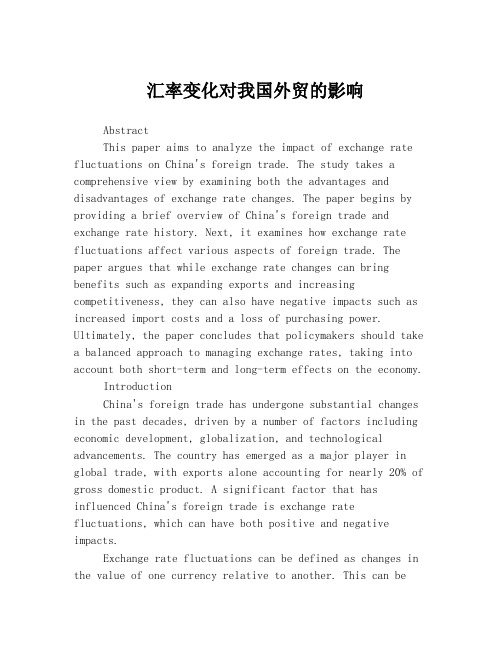
汇率变化对我国外贸的影响AbstractThis paper aims to analyze the impact of exchange rate fluctuations on China's foreign trade. The study takes a comprehensive view by examining both the advantages and disadvantages of exchange rate changes. The paper begins by providing a brief overview of China's foreign trade and exchange rate history. Next, it examines how exchange rate fluctuations affect various aspects of foreign trade. The paper argues that while exchange rate changes can bring benefits such as expanding exports and increasing competitiveness, they can also have negative impacts such as increased import costs and a loss of purchasing power. Ultimately, the paper concludes that policymakers should take a balanced approach to managing exchange rates, taking into account both short-term and long-term effects on the economy.IntroductionChina's foreign trade has undergone substantial changes in the past decades, driven by a number of factors including economic development, globalization, and technological advancements. The country has emerged as a major player in global trade, with exports alone accounting for nearly 20% of gross domestic product. A significant factor that has influenced China's foreign trade is exchange rate fluctuations, which can have both positive and negative impacts.Exchange rate fluctuations can be defined as changes in the value of one currency relative to another. This can bemeasured through a number of mechanisms, including thenominal exchange rate, which is the rate at which onecurrency can be exchanged for another, or the real exchange rate, which adjusts for differences in inflation ratesbetween countries. Fluctuations in exchange rates can occurfor a variety of reasons, including economic policies, market forces, and geopolitical events.Exchange Rates and China's Foreign Trade: An OverviewChina's exchange rate regime has evolved considerably since the country began implementing economic reforms in 1978. Initially, China implemented a system that pegged therenminbi (RMB) to the US dollar, with a strict limit on the currency's movements. This was gradually relaxed over time, leading to a managed float system in which the RMB is allowed to fluctuate within a narrow band against a basket of currencies. In 2010, China announced a move towards a more flexible exchange rate regime, which has been implemented gradually since then.Exchange rate fluctuations can have a range of effectson various aspects of China's foreign trade. For instance, a depreciation in the value of the RMB can make Chinese exports more affordable for foreign buyers, which can lead to an increase in demand and higher export revenues. Meanwhile, an appreciation in the RMB's value can make imports more affordable, which can lead to greater imports and higherimport costs for foreign buyers.Advantages of Exchange Rate Fluctuations in Chinese Foreign TradeThere are a number of advantages associated with exchange rate fluctuations for China's foreign trade. These include:1. Increased Exports: A lower value of the RMB relative to other currencies makes Chinese goods more affordable for foreign buyers. This can enhance export demand and revenues for Chinese firms, which can have a positive impact on the trade balance and support economic growth.2. Increased Competitiveness: A lower RMB value can also make Chinese firms more competitive in global markets, potentially allowing firms to capture market share from foreign competitors. This can lead to increased employment and economic growth.3. Improved Investment Attraction: A depreciated RMB can make Chinese assets more attractive to foreign investors, potentially leading to greater capital inflows and supporting further economic development.Disadvantages of Exchange Rate Fluctuations in Chinese Foreign TradeWhile exchange rate fluctuations can bring benefits to China's foreign trade, there are also some downsides. These include:1. Increased Import Costs: A lower RMB value can increase the cost of imports, which can have a negative impact on firms that rely on imported inputs or goods for their operations. This can lead to a decline in profits and potentially even business closures.2. Reduced Purchasing Power: A lower RMB value can make imports and foreign travel more expensive for Chinese consumers, affecting their purchasing power and potentially reducing domestic demand.3. Increased Inflation: A depreciated RMB value can lead to higher inflation, as the cost of imported goods increases. This can have a negative effect on the overall economy byleading to higher prices for consumers and contributing to reduced economic growth.ConclusionIn conclusion, this paper has highlighted the impact of exchange rate fluctuations on China's foreign trade. Thestudy shows that while exchange rate changes can bringbenefits such as expanding exports and increasing competitiveness, they can also have negative impacts such as increased import costs and a loss of purchasing power. Ultimately, policymakers must consider the short-term andlong-term effects on the economy when managing exchange rates.A balanced approach that takes into account both the positive and negative effects can lead to sustainable economic growth and development in the long run.。
2023年外贸英语考试真题答案解析
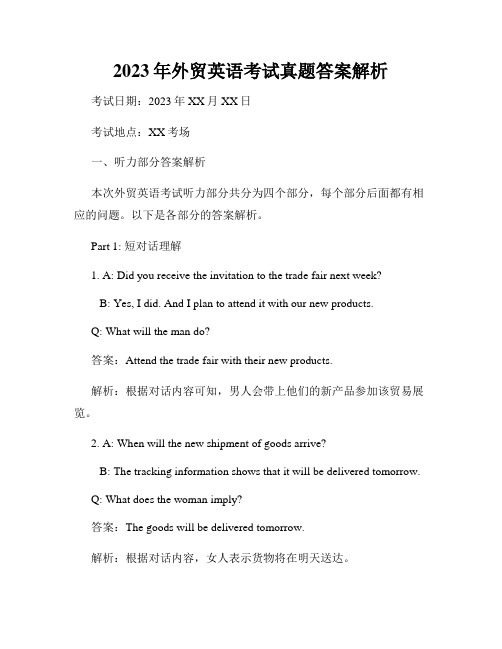
2023年外贸英语考试真题答案解析考试日期:2023年XX月XX日考试地点:XX考场一、听力部分答案解析本次外贸英语考试听力部分共分为四个部分,每个部分后面都有相应的问题。
以下是各部分的答案解析。
Part 1: 短对话理解1. A: Did you receive the invitation to the trade fair next week?B: Yes, I did. And I plan to attend it with our new products.Q: What will the man do?答案:Attend the trade fair with their new products.解析:根据对话内容可知,男人会带上他们的新产品参加该贸易展览。
2. A: When will the new shipment of goods arrive?B: The tracking information shows that it will be delivered tomorrow.Q: What does the woman imply?答案:The goods will be delivered tomorrow.解析:根据对话内容,女人表示货物将在明天送达。
Part 2: 长对话理解3. A: I heard that there will be some changes in the import policy. Have you checked the new regulations?B: Yes, I did. We need to pay attention to the updated document requirements.Q: What does the man suggest?答案:Pay attention to the updated document requirements.解析:男人建议要注意更新的文件要求。
从事外贸需要看的书籍
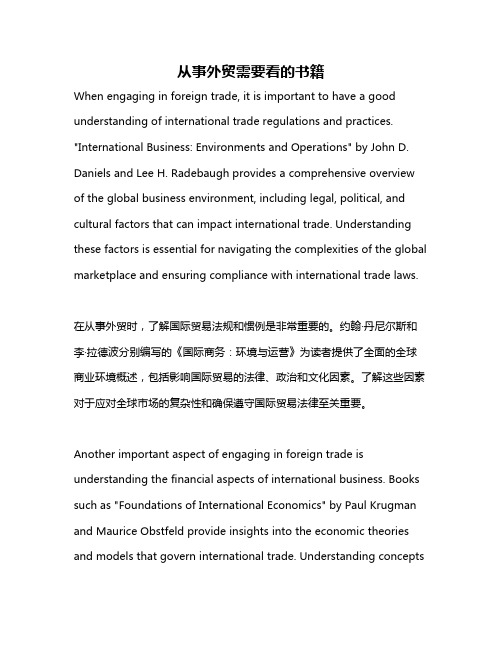
从事外贸需要看的书籍When engaging in foreign trade, it is important to have a good understanding of international trade regulations and practices. "International Business: Environments and Operations" by John D. Daniels and Lee H. Radebaugh provides a comprehensive overview of the global business environment, including legal, political, and cultural factors that can impact international trade. Understanding these factors is essential for navigating the complexities of the global marketplace and ensuring compliance with international trade laws.在从事外贸时,了解国际贸易法规和惯例是非常重要的。
约翰·丹尼尔斯和李·拉德波分别编写的《国际商务:环境与运营》为读者提供了全面的全球商业环境概述,包括影响国际贸易的法律、政治和文化因素。
了解这些因素对于应对全球市场的复杂性和确保遵守国际贸易法律至关重要。
Another important aspect of engaging in foreign trade is understanding the financial aspects of international business. Books such as "Foundations of International Economics" by Paul Krugman and Maurice Obstfeld provide insights into the economic theories and models that govern international trade. Understanding conceptssuch as exchange rates, trade balances, and foreign investment can help businesses navigate the financial complexities of global trade and make informed decisions.从事外贸的另一个重要方面是了解国际商务的财务方面。
有关汇率英语作文
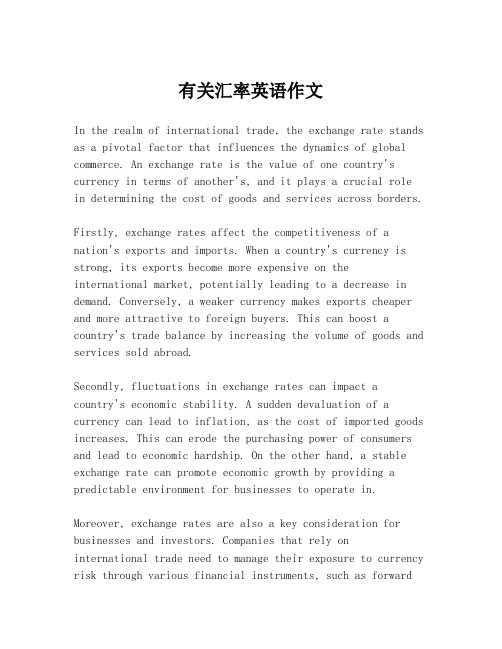
有关汇率英语作文In the realm of international trade, the exchange rate stands as a pivotal factor that influences the dynamics of global commerce. An exchange rate is the value of one country's currency in terms of another's, and it plays a crucial rolein determining the cost of goods and services across borders.Firstly, exchange rates affect the competitiveness of a nation's exports and imports. When a country's currency is strong, its exports become more expensive on theinternational market, potentially leading to a decrease in demand. Conversely, a weaker currency makes exports cheaper and more attractive to foreign buyers. This can boost a country's trade balance by increasing the volume of goods and services sold abroad.Secondly, fluctuations in exchange rates can impact acountry's economic stability. A sudden devaluation of a currency can lead to inflation, as the cost of imported goods increases. This can erode the purchasing power of consumers and lead to economic hardship. On the other hand, a stable exchange rate can promote economic growth by providing a predictable environment for businesses to operate in.Moreover, exchange rates are also a key consideration for businesses and investors. Companies that rely oninternational trade need to manage their exposure to currency risk through various financial instruments, such as forwardcontracts or options. Investors, too, must consider exchange rates when investing in foreign markets, as the value of their investments can be significantly affected by currency movements.Furthermore, the exchange rate is a tool used by governments and central banks to manage their economies. For instance, a central bank might intervene in the foreign exchange market to lower the value of its currency, aiming to stimulate exports and economic growth. However, such actions can lead to trade disputes, as other countries may retaliate with their own currency devaluations.In conclusion, the exchange rate is a complex and multifaceted element of international trade. It affects the price of goods and services, the competitiveness of nations, economic stability, and the decisions of businesses and investors. Understanding the exchange rate is essential for anyone involved in the global marketplace, as it can significantly influence the success of international trade endeavors.。
国际贸易及风险管理知识术语

国际贸易及风险管理知识术语国际贸易是指不同国家之间进行的商品和服务交换,是全球经济发展的重要组成部分。
然而,国际贸易也伴随着各种风险,因此需要进行有效的风险管理。
本文将介绍一些国际贸易及风险管理的知识术语。
1. 贸易壁垒(Trade barriers)- 指限制国际贸易的政府政策,包括关税、配额、进口许可证等。
这些贸易壁垒会对企业的跨国贸易活动造成不利影响。
2. 自由贸易(Free trade)- 是指各国之间没有任何贸易壁垒的贸易关系。
自由贸易有利于促进经济增长和国际合作,降低产品价格和提高消费者福利。
3. 跨国公司(Multinational corporation)- 是指在多个国家开展业务的公司。
跨国公司通过在不同国家之间进行贸易,利用各国的资源和市场,实现规模经济效益。
4. 进口(Import)- 指从其他国家购买商品或服务。
进口允许国内企业获得更多选择,增加消费者福利,但也可能对国内产业造成竞争压力。
5. 出口(Export)- 指将产品或服务销售到其他国家。
出口有助于创造就业机会和提高经济增长,同时也提高了国内企业的竞争力和知名度。
6. 汇率风险(Exchange rate risk)- 是指由于货币汇率波动导致的交易风险。
汇率风险会对进口商和出口商的盈利能力产生影响,因此需要进行风险管理。
7. 宏观经济风险(Macroeconomic risk)- 指国家或地区经济波动对国际贸易的影响。
宏观经济风险可能包括通货膨胀、利率波动、政治不稳定等因素。
8. 信用风险(Credit risk)- 是指在国际贸易中,买方或卖方无法履行合同义务的风险。
为了减少风险,企业可以选择使用信用保险或采取其他措施来降低无法收款或供应的风险。
9. 运输风险(Transportation risk)- 是指国际贸易过程中货物运输过程中可能发生的损失、延误或损坏。
为了管理运输风险,企业可以购买货物保险或选择可靠的物流合作伙伴。
国际贸易英文说明

国际贸易英文说明International Trade ExplanationInternational trade refers to the exchange of goods and services between countries. It involves the buying and selling of goods and services across national borders. International trade is a vital component of the global economy and plays a significant role in promoting economic growth and development.There are several reasons why countries engage in international trade. Firstly, countries often have different resources and capabilities, leading to the production of different goods and services at varying costs. International trade allows countries to specialize in producing goods and services in which they have a comparative advantage, meaning they can produce them at a lower opportunity cost than other countries. This leads to increased efficiency and allows for the production and consumption of a wider range of goods and services.International trade also allows countries to access goods and services that they cannot produce or produce efficiently themselves. For example, a country may import natural resources that are not available within its borders or purchase advanced technology from another country. By participating in international trade, countries can benefit from a wider variety of goods and services, improving the standard of living for their citizens.Another benefit of international trade is the opportunity for economies of scale. When countries engage in international trade, they can increase production and take advantage of economies ofscale, leading to lower production costs. This can result in lower-priced goods and services for consumers.International trade can take place through various channels, including the export and import of physical goods, as well as the provision and receipt of services. Trade can occur through bilateral agreements between two countries or multilateral agreements involving multiple countries. There are also international organizations, such as the World Trade Organization (WTO), that promote and regulate international trade.However, international trade is not without challenges and risks. Trade barriers, such as tariffs, quotas, or regulations, can hinder trade flows and limit the potential benefits of international trade. Additionally, fluctuations in currency exchange rates, political instability, and protectionist measures can also impact international trade.Overall, international trade is essential for global economic growth and prosperity. It allows countries to specialize in the production of goods and services in which they have a comparative advantage, increases competition, and promotes innovation. By fostering cooperation and interdependence among countries, international trade plays a crucial role in fostering economic development and improving living standards worldwide.。
外贸公司英文演讲

外贸公司英文演讲Ladies and gentlemen,Thank you for giving me this opportunity to share my thoughts on the topic of international trade. As a representative of a foreign trade company, I am here to talk about the importance of international trade and the role that our company plays in this field.First and foremost, international trade is the backbone of the global economy. It facilitates the exchange of goods and services between different countries, enabling economic growth and prosperity. Through international trade, countries have access to a wider range of products and resources, which leads to increased competitiveness and innovation.Our company plays a vital role in this process by connecting businesses from different countries. We specialize in importing and exporting goods, helping companies find buyers or suppliers in foreign markets. By bridging the gap between buyers and suppliers, we facilitate trade relationships and contribute to the development of global commerce.One of the key advantages of international trade is the opportunity for companies to expand their markets and reach a larger customer base. Byexporting our products, we can tap into international markets and diversify our sources of revenue. This not only benefits our company but also the local economy as a whole, by creating jobs and fostering economic growth.In addition to the economic benefits, international trade promotes cultural exchange and understanding between nations. Through trade, we have the opportunity to learn about different cultures and traditions, which enriches our lives and broadens our perspectives. Thiscross-cultural interaction fosters a sense of global community and promotes peace and cooperation.However, it is essential to acknowledge the challenges that come with international trade. Trade barriers, such as tariffs and quotas, can hinder the flow of goods and limit market access. Additionally, fluctuations in currency exchange rates and geopolitical uncertainties can impact trade dynamics. Nevertheless, we must navigate these challenges and adapt to the ever-evolving global market to ensure the success of our international trade endeavors.To conclude, international trade is the lifeblood of the global economy, driving economic growth, fostering cultural exchange, and promotingpeace and understanding. As a foreign trade company, we play a crucial role in facilitating trade relationships and creating mutual benefits for businesses worldwide. We are committed to embracing the opportunities and challenges that come with international trade and contributing to a prosperous and interconnected world.Thank you for your attention.(以上仅供参考)。
中国外贸发展英语作文

中国外贸发展英语作文English:China's foreign trade development has experienced significant growth over the past few decades, becoming a major player in the global economy. This growth can be attributed to various factors, such as China's open-door policy, its large labor force, and its focus on exporting manufactured goods. The country has also actively participated in international trade agreements, expanding its market reach and increasing trade volumes. Additionally, the development of infrastructure, such as ports and transportation networks, has greatly facilitated the flow of goods in and out of the country. As a result, China has established itself as one of the world's leading exporters and has formed strong trade relationships with countries all over the world. However, challenges such as trade disputes, fluctuating exchange rates, and global economic uncertainties continue to impact China's foreign trade development. To address these challenges, China is focusing on diversifying its trade partners, promoting innovation and technology, and adapting to changing market demands. Overall, China's foreign trade development hasbeen a key driver of its economic growth and will continue to play a crucial role in shaping its future economic landscape.中文翻译:中国的外贸发展在过去几十年中经历了显著增长,成为全球经济的重要参与者。
实际有效汇率对服务贸易出口的影响--基于全球价值链嵌入视角
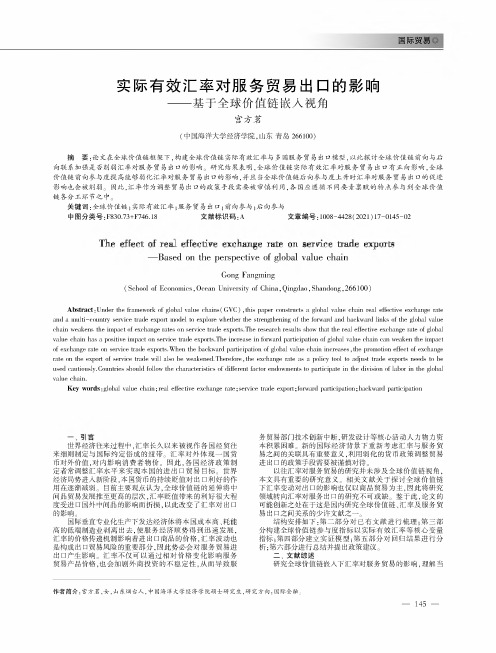
国际贸易©实际有效汇率对服务贸易出口的影响——基于全球价值链嵌入视角宫方茗(中国海洋大学经济学院,山东青岛266100)摘要:论文在全球价值链框架下,构建全球价值链实际有效汇率与多国服务贸易出口模型,以此探讨全球价值链前向与后向联系加强是否削弱汇率对服务贸易出口的影响。
研究结果表明,全球价值链实际有效汇率对服务贸易出口有正向影响,全球价值链前向参与度提高能够弱化汇率对服务贸易出口的影响,并且当全球价值链后向参与度上升时汇率对服务贸易出口的促进影响也会被削弱。
因此,汇率作为调整贸易出口的政策手段需要被审慎利用,各国应遵循不同要素禀赋的特点参与到全球价值链各分工环节之中。
关键词:全球价值链;实际有效汇率;服务贸易出口;前向参与;后向参与中图分类号:F830.73+F746.18文献标识码:A文章编号:1008-4428(2021)17-0145-02The effect of real effective exchange rale on、erv ice trade exports——Based on the perspective of global value chainGong Fangming(School of Economics,Ocean University of China,Qingdao,Shandong,266100)Abstract:Under the framework of global value chains(GVC),this paper constructs a global value chain real effective exchange rate and a multi-country service trade export model to explore whether the strengthening of the forward and backward links of the global value chain weakens the impact of exchange rates on service trade exports.The research results show that the real effective exchange rate of global value chain has a positive impact on service trade exports.The increase in forward participation of global value chain can weaken the impact of exchange rate on service trade exports.When the backward participation of global value chain increases,the promotion effect of exchange rate on the export of service trade will also be weakened.Therefore,the exchange rate as a policy tool to adjust trade exports needs to be used cautiously.Countries should follow the characteristics of different factor endowments to participate in the division of labor in the global value chain.Key words:global value chain;real effective exchange rate;service trade export;forward participation;backward participation一、弓言世界经济往来过程中,汇率长久以来被视作各国经贸往来细则制定与国际约定俗成的纽带。
经济全球化指标
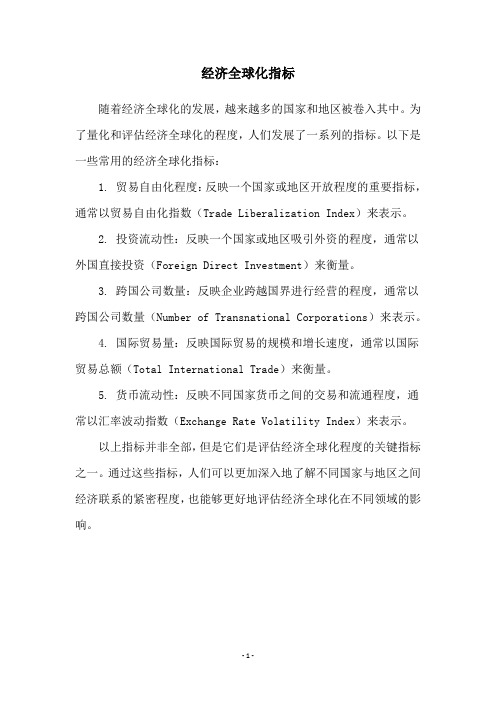
经济全球化指标
随着经济全球化的发展,越来越多的国家和地区被卷入其中。
为了量化和评估经济全球化的程度,人们发展了一系列的指标。
以下是一些常用的经济全球化指标:
1. 贸易自由化程度:反映一个国家或地区开放程度的重要指标,通常以贸易自由化指数(Trade Liberalization Index)来表示。
2. 投资流动性:反映一个国家或地区吸引外资的程度,通常以外国直接投资(Foreign Direct Investment)来衡量。
3. 跨国公司数量:反映企业跨越国界进行经营的程度,通常以跨国公司数量(Number of Transnational Corporations)来表示。
4. 国际贸易量:反映国际贸易的规模和增长速度,通常以国际贸易总额(Total International Trade)来衡量。
5. 货币流动性:反映不同国家货币之间的交易和流通程度,通常以汇率波动指数(Exchange Rate Volatility Index)来表示。
以上指标并非全部,但是它们是评估经济全球化程度的关键指标之一。
通过这些指标,人们可以更加深入地了解不同国家与地区之间经济联系的紧密程度,也能够更好地评估经济全球化在不同领域的影响。
- 1 -。
汇率(exchangerate)

汇率(exchangerate)
亦称汇价、兑换率或外汇牌价等。
两种货币兑换的比率或者比价,即以一国货币表示的另一国货币的价格。
汇率作为一种兑换比率,反映了不同国家货币价值的对比关系。
这一比率的确定,在国际交往中具有重要的作用。
作为两种货币折算的标准,它是外汇买卖的基本依据;作为国内和国外价格联系和转换的工具,这旨国际贸易核算的标准。
汇率的确定,也为企业的外币业务会计处理提供了可能。
因为企业将各项以非记账本位币(即会计概念上的外币)计价核算的业务折算为记账本位币入账时,必须要寻找一个能使两种货币相互折算的中间媒介,而这个媒介一定要正确、合理并得到社会公认,以确保企业各项会计要素计价的正确性,这个中间媒介当然只能是外币的汇率。
汇率的分类方法很多。
按以本国货币还是以外国货币作为折算基础来表示本国货币与外国货币的价值比值来划分,沁率有两种标价方法:直接标价法和间接标价法,按照不同货币之间的比价是否经常变动来划分,则可分类固定汇率和浮动汇率;按照外币买卖成交后交割期不同来划分,还可分为即期汇率和远期汇率;按照会计记账当时所采用的汇率或账面汇率;按照银行向客户买入或卖出外币时所采用的汇率来划分,又可分为买入汇率、卖出汇率和中间汇率。
